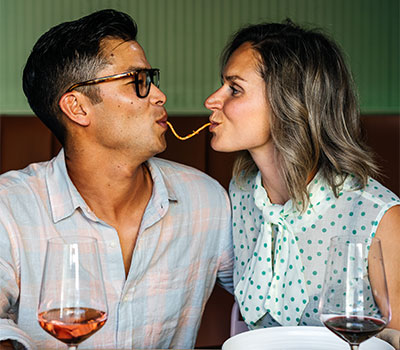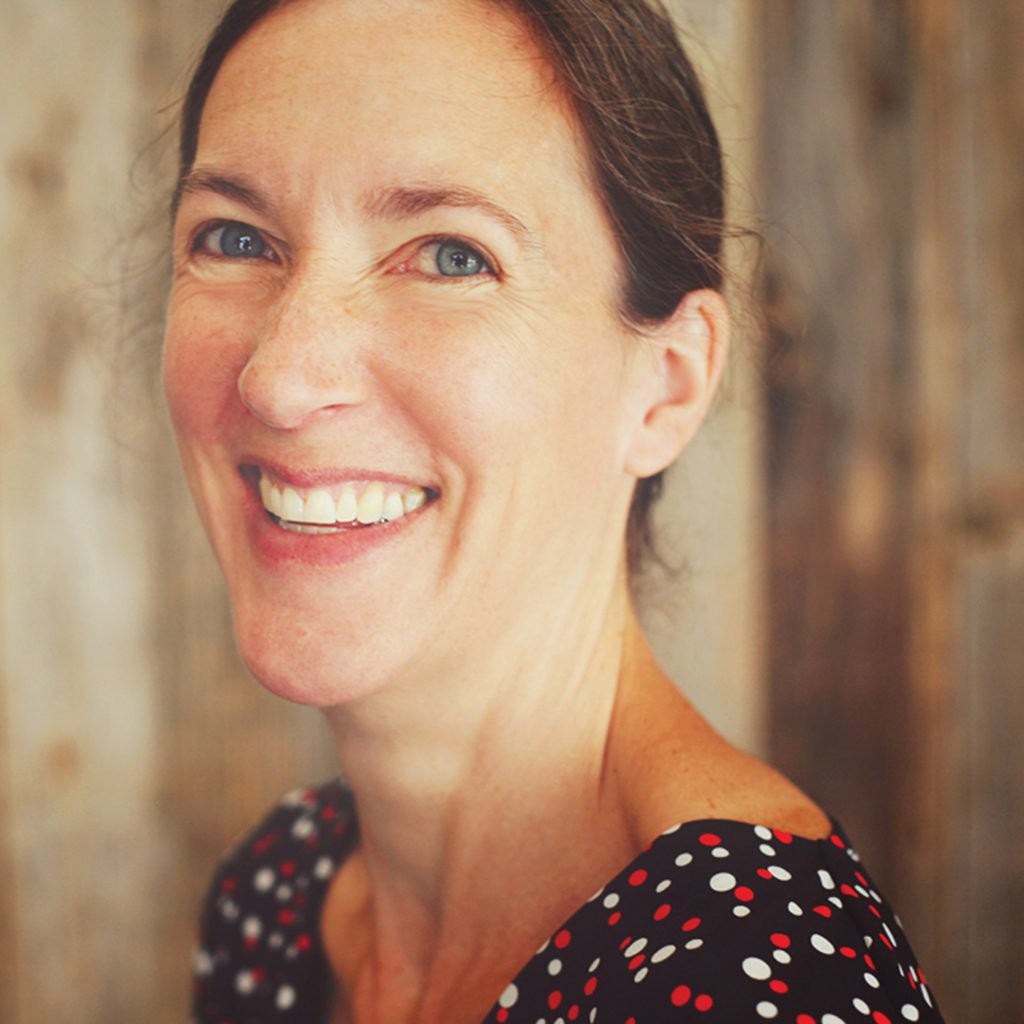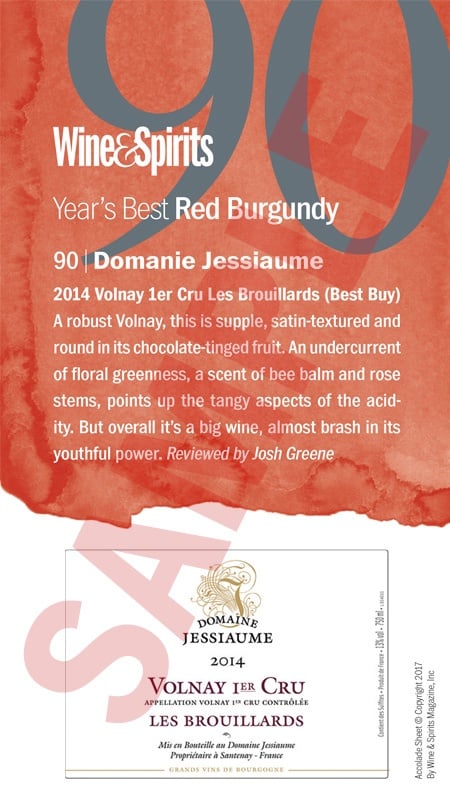

Who opens a new wine shop in the middle of a global pandemic? Josiah Baldivino and Stevie Stacionis, for two. The husband-and-wife team behind Oakland’s Bay Grape (retail with tasting bar) and Mama (restaurant) opened Bay Grape Napa in March 2021. If you want the story of how the move was partly inspired by a psychedelic experience in the Utah desert, the Napa Valley Register has you covered. As Baldivino explains below, it also had less cosmic origins: They were simply confident that a lot of wine industry folks in Napa were interested in what they were doing in Oakland. Here, Baldivino explains how the year played out in both retail and restaurant contexts.
What possessed you to open Bay Grape Napa in March 2021, in the middle of the pandemic?
We had a lot of friends that were up here already who would come down to the Oakland shop. And we were like: Why do you drive all they way down here? They said: There’s nothing like it up there.
There are other cool shops and wine places, but there’s not quite a shop that does what we do. So we’ve definitely become the industry spot. We have those affordable, off-the-beaten-path wines that people working in wine up here crave. If you’re working with cab and chardonnay all day, you want something a little more esoteric.
Each location now has its own buyer. Matt Lopez is doing the wine buying in Oakland, and Samantha Bauer is the GM and buyer for our Napa location. So a lot of my life lately is training and managing. A lot more people [in Napa] know who Sam is rather than me, which is awesome.
You have a pretty unique vantage point in that you run both a retail operation and a restaurant. During the pandemic, what have been the most stark differences between how the pandemic affected retail and how it affected resataurants?
Retail was definitely a little bit more adaptable. We saw a decline in retail for sure, because 30% of our sales were people hanging out at the bar, and classes, and stuff like that. And once that went away, we saw numbers drop. I mean, there were busy days here and there, but all in all it was pretty scary. Luckily, we had a good following, and our guests were super cool. It was awesome to have so much support from Oakland. If we didn’t have the [Bay Grape] wine club, though, we would have been pretty screwed.
The restaurant has been extremely difficult, Stevie and I were in there every day, hustling, even doing the sandwiches. And at some point we had to swallow our pride and have a talk with the landlord and say: We can’t do this; we’re not surviving. We can pay you rent, but we can’t afford to be open and have the water and electricity on. And our landlords have been super cool. If not for that, we would be out of business. They were basically like: If you’re not bringing in any revenue, we’re not going to charge you.
Luckily, they own the building; it was their dad’s, so they were basically just paying property tax. But I feel for landlords, too. Especially if I was a landlord who still had to pay the mortgage or whatever, we’re both in a hard place, you know?
Even now [with the return of in-person dining] it’s tough. In early December it really started to take off, and we saw really steady sales. But as soon as the Omicron thing came out, it was an immediate decline. We lost around 50% of our covers in an instant.
Did you launch any new wine concepts at Mama to keep guests engaged?
We saw everybody doing things to-go, and we went to places we like to support some friends and restaurants who were doing it, but we noticed that, even though the food was exceptional, it just didn’t have the same feel when you were eating it out of the box.
Then we started plating things really nicely, and it was better.
So, we asked ourselves: How do we re-create the Mama dining experience at home? We ended up with a date night pack where some of the stuff was pre-made, but it also had dried pasta, and we explained exactly how to cook the pasta. It had cheese you could grate over the pasta yourself, it had a salad, it had a playlist to go with it, a candle, a little bud vase and a flower. You could get wines by the glass—little vials of wine. That was during the dark ages [of COVID], when people were so depressed, and it worked, it was worth doing it, but it wasn’t sustainable. We were actually losing money.
So many people who didn’t work in restaurants would say: These people are doing to-go, or they’re selling wine retail, they must be fine. But no. Just by having the doors open and staff there, you need to make a certain number of sales.
Any noticeable trends as people returned to in-person dining?
It’s hard for me to say, because we changed the wine list up, so it was smaller. We were trying to have the turn times be quicker, because we knew people didn’t want to hang out as long, and there was also a reduction in seats [due to social distancing], so we couldn’t just have people hanging out. We sped it up, and people seemed to go with it.
Also, I took away the “Baller” list. So on average, the price for the bottles used to be a bit higher. I didn’t want to have a $500 bottle of Barolo on there and then have them be out of there in like an hour. That seemed rude to them and the wine and the winemaker.
What has the staffing situation been like at Mama?
At the beginning it was tough because we were just trying to keep people who were already employed with us. But once it started to get really slow, we saw a decline, and it was really hard to hire people, so we basically did it ourselves. Then there was the time when unemployment was running out, and there were a lot of talented people coming back. And then it declined again.
We were really lucky because the overall education we do with staff—I’m in there once a week doing wine classes—it didn’t really matter. A lot of people you could hire were really green—no restaurant experience, no wine experience. So one thing we were lucky with was that already fit into our overall training: I don’t care how much you know about wine or service, I’ll teach you!
We have such an amazing group of people who are learning, and they’re getting really good. When you do that—when you train your staff and bring them up—I think they’re more loyal, too. They’re not as quick to jump to another job.
We also implemented an auto-gratuity added to your check that goes to the back of the house. Before the pandemic, every restaurant was trying to undercut each other. And offering stuff for what was way too cheap. So the margins were super slim; it was hard to be able to take care of your staff. Coming up through restaurants, the one thing I saw was: The back of the house always got screwed. But they’re part of the team, too.
Going into 2022, what are you most looking forward to from a business perspective?
Hopefully, things start to go back to normal a little. That’s all I can hope for for everyone and every business. I just want to see people be comfortable hanging out with each other again.
I want business to pick up, and I want people to support local businesses. After all this stuff, Amazon is kiling it, and a lot of local business are getting screwed. I think what happened to restaurants is particularly sad. Delivery services are taking a big cut, but restaurants almost have to do it if they want to stay in business. I would love to see folks supporting local restaurants and mom-and-pop businesses across the board, and stop giving money to Amazon.
Longtime senior editor at Wine & Spirits magazine, Luke now works for the Stanford Technology Ventures Program.
This is a W&S web exclusive. Get access to all of our feature stories by signing up today.




















